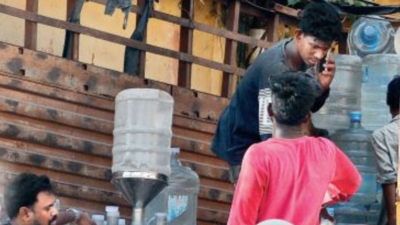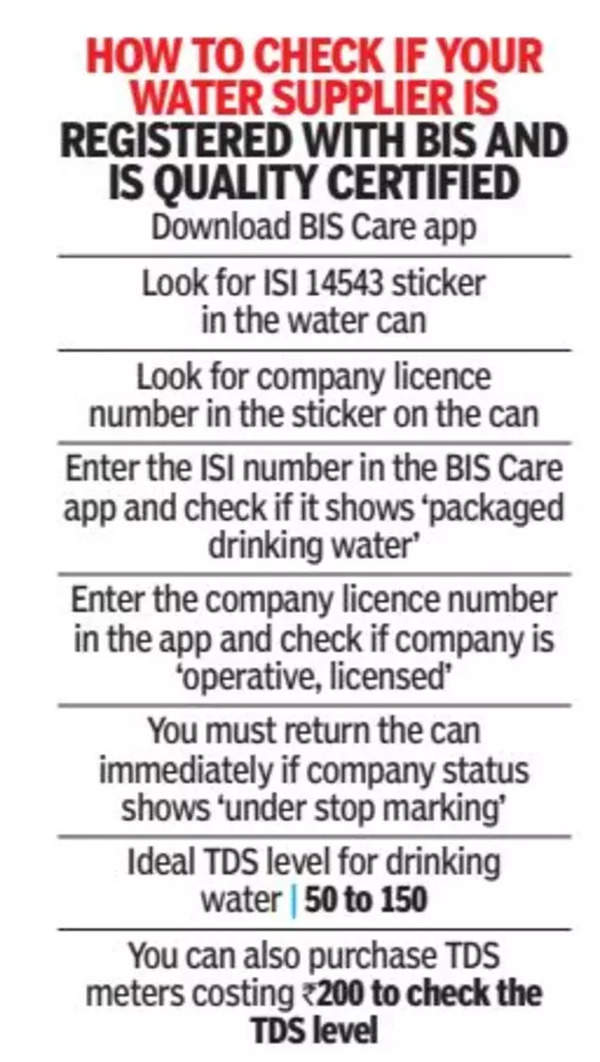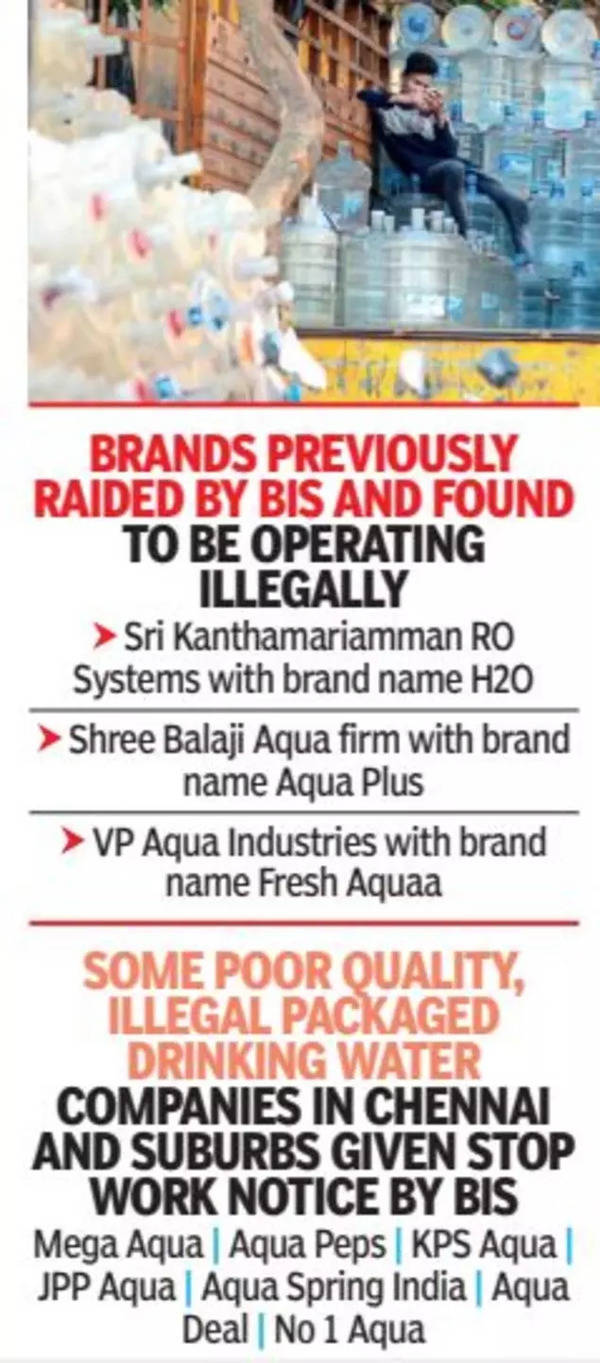Top Searches
- News
- City News
- chennai News
- Vendors in Chennai burst bubble of safety of water cans
Vendors in Chennai burst bubble of safety of water cans

Chennai's packaged drinking water demand is about 12 lakh bubble top cans a day during summer, as per rough estimates by associations.
Hygienic drinking water is a basic right of everyone. But, how good is the quality of water you buy in bubble top cans?
As mercury levels in the city rise so does the proportion of illegal and unhygienic bubble top water cans in the market.

For the past few weeks, residents have been receiving cans that are damaged, have no brand stickers and ISI mark or have multiple stickers on them. In areas such as Mylapore and Mandaveli, vendors sell water in such cans on pavements for Rs 20 each.

While companies are required to get Bureau of Indian Standards (BIS) licence to sell packaged water, members of vendor associations say unlicensed ones are on the rise.
The city’s packaged drinking water demand is about 12 lakh bubble top cans a day during summer, as per rough estimates by associations. Of these, BIS registered operators supply about 7 lakh cans, while the void in the demand is filled by illegal cans.

“The number of registered operators have reduced from 750 to 512 in the past few years. The testing mechanism of BIS is rigorous. A manufacturer pays up to Rs 1. 25 lakh for licence and if they subsequently fail in tests, they must pay up toRs 40,000 as test charges. Vendors who fail don’t renew their licence but operate illegally from their existing plants,” said E Saravanan, general secretary of Greater Tamil Nadu Packaged Drinking Water Association.
Saravanan said suppliers sell water from their illegal units to small private tankers. “These tankers go around the city with a tap fixed to them. The local distributors collect water in old and used 20-litre bubble top cans for Rs 10 and sell it for35 to their customers. The quality of this water or the hygiene of the cans cannot be assured as they don’t undergo BIS tests,” he added.
Officials with BIS Chennai branch said they deal with quality checks at plants and in the market, and raid units who misuse stickers or use branding with expired licences.
“We collect samples from manufacturing plants as well as the market. If there are shortcomings, the manufacturer is pulled up for further tests. About nonbranded cans, we inform food safety officials who carry out raids,” said a BIS official in the city.
As per food safety and security regulations 2011, no one can manufacture, sell or exhibit packaged drinking water without a BIS licence. FSSAI in 2021 also mandated vendors to upload BIS licences while applying for FSSAI
licence. These rules empower the food safety department to go against illegal vendors as nonbranded or unlicensed sales are against its rules.
R Lalvena, commissioner of the food safety department, said they hold regular inspections at units and act against erring vendors. “However, when it comes to small tankers selling the water on the loose, it is the job of the local body to act,” he added.
GCC health officer Dr M Jagadeesan said the corporation only tests water quality and takes action if the water causes health issues. “The laws are with the food safety department. We don’t get into the legality of the tankers selling water,” he added.
As mercury levels in the city rise so does the proportion of illegal and unhygienic bubble top water cans in the market.

For the past few weeks, residents have been receiving cans that are damaged, have no brand stickers and ISI mark or have multiple stickers on them. In areas such as Mylapore and Mandaveli, vendors sell water in such cans on pavements for Rs 20 each.

While companies are required to get Bureau of Indian Standards (BIS) licence to sell packaged water, members of vendor associations say unlicensed ones are on the rise.
The city’s packaged drinking water demand is about 12 lakh bubble top cans a day during summer, as per rough estimates by associations. Of these, BIS registered operators supply about 7 lakh cans, while the void in the demand is filled by illegal cans.

“The number of registered operators have reduced from 750 to 512 in the past few years. The testing mechanism of BIS is rigorous. A manufacturer pays up to Rs 1. 25 lakh for licence and if they subsequently fail in tests, they must pay up toRs 40,000 as test charges. Vendors who fail don’t renew their licence but operate illegally from their existing plants,” said E Saravanan, general secretary of Greater Tamil Nadu Packaged Drinking Water Association.
Saravanan said suppliers sell water from their illegal units to small private tankers. “These tankers go around the city with a tap fixed to them. The local distributors collect water in old and used 20-litre bubble top cans for Rs 10 and sell it for35 to their customers. The quality of this water or the hygiene of the cans cannot be assured as they don’t undergo BIS tests,” he added.
Officials with BIS Chennai branch said they deal with quality checks at plants and in the market, and raid units who misuse stickers or use branding with expired licences.
“We collect samples from manufacturing plants as well as the market. If there are shortcomings, the manufacturer is pulled up for further tests. About nonbranded cans, we inform food safety officials who carry out raids,” said a BIS official in the city.
As per food safety and security regulations 2011, no one can manufacture, sell or exhibit packaged drinking water without a BIS licence. FSSAI in 2021 also mandated vendors to upload BIS licences while applying for FSSAI
licence. These rules empower the food safety department to go against illegal vendors as nonbranded or unlicensed sales are against its rules.
R Lalvena, commissioner of the food safety department, said they hold regular inspections at units and act against erring vendors. “However, when it comes to small tankers selling the water on the loose, it is the job of the local body to act,” he added.
GCC health officer Dr M Jagadeesan said the corporation only tests water quality and takes action if the water causes health issues. “The laws are with the food safety department. We don’t get into the legality of the tankers selling water,” he added.
Start a Conversation
FOLLOW US ON SOCIAL MEDIA
FacebookTwitterInstagramKOO APPYOUTUBE









